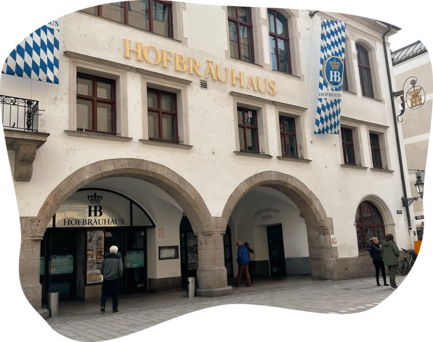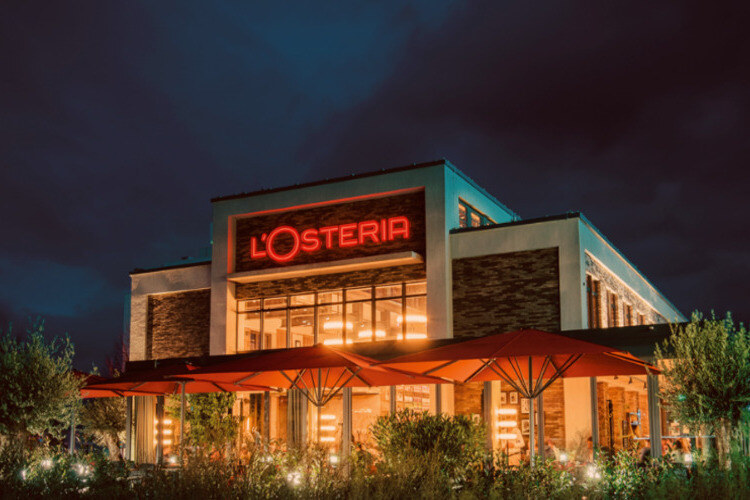Gastronomic pioneer in the heart of Munich
The Hofbräuhaus combines Bavarian coziness with digital processes

In the center of Munich, surrounded by centuries-old walls, the Hofbräuhaus has established itself as a symbol of Bavarian culture. With around 700 employees, 3,500 seats and 6 million guests a year, the Hofbräuhaus has more to offer than just traditional beer and hearty food - it is THE pioneer in the digital transformation of the hospitality industry. The adventure began in 2007, when Michael and Wolfgang Sperger, the brothers at the helm of this traditional business, realized that advanced processes were the only way to preserve quality and relieve pressure on the historic premises.
In this article, we show how Hofbräuhaus is redefining gastronomy with a state-of-the-art production facility in Brunnthal, 15 km outside of Munich. Through the use of artificial intelligence and a highly efficient process for logistics and preparation, Hofbräuhaus offers a unique gastronomic experience where every ingredient and detail is precisely tailored to the needs of the guest. Digitalization overcomes challenges such as high costs, staff shortages and food waste.
Digitalization - Invisible but indispensable
Michael and Wolfgang Sperger see digitalization as an instrument to honour Bavarian tradition, not to replace it. Their aim is to use digitalization in such a way that it is visible (and only behind the scenes) but not tangible. The result is a seamless integration of state-of-the-art technology that ensures the usual experience for guests with fresh food and drinks of the highest quality. In order to do justice to this and at the same time relieve the capacities of the historic location, Hofbräuhaus established a state-of-the-art production facility in the suburb of Brunnthal with its own canteen kitchen, butcher's shop, bakery and confectionery.
Every day, freshly prepared ingredients for the 40 or so dishes on the menu are delivered to the Hofbräuhaus by refrigerated truck. There, the food is prepared using only the ingredients supplied.
With the help of sell & pick's AI-based turnover and sales forecast, the required quantities of food that will be sold in the Hofbräuhaus in the coming days are predicted. Based on these predictions, the ingredients are weighed to the exact gram and transported from the production facility in Brunnthal to the Hofbräuhaus.
This logistical process is supplemented by an efficient cycle: dirty dishes are taken to the third location in Parsdorf, where the scullery and dry storage are located. Not only is the crockery cleaned there, but the trucks are also loaded with fresh crockery and non-food items such as napkins and beer mats - all in line with the forecast. After loading, the truck continues on its route, driving to Brunnthal to pick up the food and then to the Hofbräuhaus to unload the delivery and pick up the dirty dishes. This process relieves the service and kitchen staff as much as possible and allows them to focus almost exclusively on the well-being of the guests.
Complete digitalization of processes
Today, every process at Hofbräuhaus is digitally recorded and optimized by a tailor-made ERP system. The intelligent AI-based turnover and sales forecast from sell & pick is based on historical sales data as well as turnover-relevant factors such as weather data, vacation and public holiday calendars from various countries and the trade fair and soccer match schedule at Munich's Allianz Arena.
Precise recipe management and innovative warehousing
Recipe management at Hofbräuhaus is a prime example of precision. IT-supported workstations with integrated scales ensure that recipes are adhered to exactly. This guarantees the consistently high quality of the food. The automated warehouse makes a significant contribution to reducing stock levels, increases the freshness of the products and reduces capital commitment. It also reduces manual handling and relieves the strain on employees. Another advantage of this system is that goods are delivered on demand, which drastically reduces the need for storage space. The space freed up is converted into valuable guest space to accommodate even more visitors. To determine the demand for a specific dish, such as cheese spaetzle, for example, the proportion of total sales of the dish is first calculated. Based on this, as well as the sales price of the dish, the predicted number of portions sold is determined. The ingredients are then planned on the basis of this data. Now the process of precisely balancing the weights of the individual ingredients - spaetzle, cheese, cream and a special spice mix - begins. Each ingredient is weighed separately and measured exactly according to the recipe at the Brunnthal production site in order to achieve the predicted quantities. They are then transported to the Hofbräuhaus by the company's own truck. This operational efficiency makes it possible to guarantee the high quality of the food, even with just six trained chefs and around 20 assistants. This is particularly impressive in view of the up to 16,000 guests per day!
The kitchen: maximum efficiency at the stove
The digital processes also take place at the stove. Every chef is informed in real time about which dishes are to be prepared. This enables dynamic and efficient kitchen management. This digitally controlled production ensures that food is prepared on time and significantly reduces material costs. Let's remember the distribution of the quantities of cheese spaetzle in the previous paragraph. When a guest orders these, the individual components are mixed cold and portioned onto the plate. They are then heated in the convection oven for a clearly defined period of time for the production process. Finally, the spaetzle are sprinkled with fried onions and brought to the guest ready to serve in less than 10 minutes - quick, fresh and delicious.
Gastronomy: service at the touch of a button
Digitalization also offers clear advantages in the service area. All restaurant components, including the dispensing system, refrigerators and invoice printers, are integrated into the central ERP system. The 30 touch terminals make it easier for the 100 or so service staff per shift to take orders and create invoices. This not only leads to a smooth flow of data for precise turnover and sales forecasting, but also enables a stress-free kitchen and relieves employees by simplifying routine tasks, leaving more time for guest service.
Acceptance and future prospects
Despite initial skepticism, the digital support has proven to be a blessing. Hofbräuhaus employees welcome the changes, as they make everyday work much easier and help to resolve conflicts and overcome language barriers. The digital infrastructure helps to compensate for the shortage of skilled staff by providing high quality and precision, which has a direct impact on guest satisfaction - and that is exactly what guests appreciate and keep coming back for.
Conclusion
The Hofbräuhaus is therefore not only a symbol of the Bavarian way of life and history, but also of progressive gastronomy that faces up to the challenges of the times and masters them with flying colors. With the introduction of sell & pick, Hofbräuhaus has realized a vision of the future: A precise forecast that allows resources to be planned effectively, costs to be saved and food waste to be significantly reduced. These optimized processes help to overcome many of the challenges facing the catering industry today. Digitalization allows Hofbräuhaus to not only preserve its historical essence, but also to take a leading role in the modern gastronomy world. With around 6 million guests and a turnover of several million euros a year, the Hofbräuhaus is a living example of how tradition and technology can successfully go hand in hand.

%20(1).jpg)

